-

新人教版高中英语选修2Unit 1 Science and Scientists-Reading and thinking教学设计
Step 5: After learning the text, discuss with your peers about the following questions:1.John Snow believed Idea 2 was right. How did he finally prove it?2. Do you think John Snow would have solved this problem without the map?3. Cholera is a 19th century disease. What disease do you think is similar to cholera today?SARS and Covid-19 because they are both deadly and fatally infectious, have an unknown cause and need serious public health care to solve them urgently.keys:1. John Snow finally proved his idea because he found an outbreak that was clearly related to cholera, collected information and was able to tie cases outside the area to the polluted water.2. No. The map helped John Snow organize his ideas. He was able to identify those households that had had many deaths and check their water-drinking habits. He identified those houses that had had no deaths and surveyed their drinking habits. The evidence clearly pointed to the polluted water being the cause.3. SARS and Covid-19 because they are both deadly and fatally infectious, have an unknown cause and need serious public health care to solve them urgently.Step 6: Consolidate what you have learned by filling in the blanks:John Snow was a well-known _1___ in London in the _2__ century. He wanted to find the _3_____ of cholera in order to help people ___4_____ it. In 1854 when a cholera __5__ London, he began to gather information. He ___6__ on a map ___7___ all the dead people had lived and he found that many people who had ___8____ (drink) the dirty water from the __9____ died. So he decided that the polluted water ___10____ cholera. He suggested that the ___11__ of all water supplies should be _12______ and new methods of dealing with ____13___ water be found. Finally, “King Cholera” was __14_____.Keys: 1. doctor 2. 19th 3.cause 4.infected with 5.hit 6.marked 7.where 8.drunk 9.pump 10.carried 11.source 12.examined 13.polluted 14.defeatedHomework: Retell the text after class and preview its language points

新人教版高中英语选修2Unit 1 Science and Scientists-Using langauge教学设计
This happens because the dish soap molecules have a strong negative charge, and the milk molecules have a strong positive charge. Like magnets, these molecules are attracted to each other, and so they appear to move around on the plate, taking the food coloring with them, making it look like the colors are quickly moving to escape from the soap.Listening text:? Judy: Oh, I'm so sorry that you were ill and couldn't come with us on our field trip. How are you feeling now? Better?? Bill: Much better, thanks. But how was it?? Judy: Wonderful! I especially liked an area of the museum called Light Games.it was really cool. They had a hall of mirrors where I could see myself reflected thousands of times!? Bill: A hall of mirrors can be a lot of fun. What else did they have?? Judy: Well, they had an experiment where we looked at a blue screen for a while, and then suddenly we could see tiny bright lights moving around on it. You'll never guess what those bright lights were!? Bill: Come on, tell me!? Judy: They were our own blood cells. For some reason, our eyes play tricks on us when we look at a blue screen, and we can see our own blood cells moving around like little lights! But there was another thing I liked better. I stood in front of a white light, and it cast different shadows of me in every color of the rainbow!? Bill: Oh, I wish I had been there. Tell me more!? Judy: Well, they had another area for sound. They had a giant piano keyboard that you could use your feet to play. But then, instead of playing the sounds of a piano, it played the voices of classical singers! Then they had a giant dish, and when you spoke into it, it reflected the sound back and made it louder. You could use it to speak in a whisper to someone 17 meters away.? Bill: It all sounds so cool. I wish I could have gone with you? Judy: I know, but we can go together this weekend. I'd love to go there again!? Bill: That sounds like a great idea!

新人教版高中英语选修2Unit 2 Bridging Cultures-Discovering useful structures教学设计
The grammar of this unit is designed to review noun clauses. Sentences that use nouns in a sentence are called noun clauses. Nominal clauses can act as subject, object, predicate, appositive and other components in compound sentences. According to the above-mentioned different grammatical functions, nominal clauses are divided into subject clause, object clause, predicate clause and appositive clause. In this unit, we will review the three kinds of nominal clauses. Appositive clauses are not required to be mastered in the optional compulsory stage, so they are not involved.1. Guide the students to judge the compound sentences and determine the composition of the clauses in the sentence.2. Instruct students to try to learn grammar by generalizing grammar rules, controlling written practice, and semi-open oral output.3. Inspire the students to systematize the function and usage of noun clause1.Instruct students to try to learn grammar by generalizing grammar rules, controlling written practice, and semi-open oral output.2.Inspire the students to systematize the function and usage of noun clauseStep1: The teacher ask studetns to find out more nominal clauses from the reading passage and udnerline the nominal clauses.

新人教版高中英语选修2Unit 3 Food and Culture-Discovering useful structures教学设计
The newspaper reported more than 100 people had been killed in the thunderstorm.报纸报道说有一百多人在暴风雨中丧生。(2)before、when、by the time、until、after、once等引导的时间状语从句的谓语是一般过去时,以及by、before后面接过去的时间时,主句动作发生在从句的动作或过去的时间之前且表示被动时,要用过去完成时的被动语态。By the time my brother was 10, he had been sent to Italy.我弟弟10岁前就已经被送到意大利了。Tons of rice had been produced by the end of last month. 到上月底已生产了好几吨大米。(3) It was the first/second/last ... time that ...句中that引导的定语从句中,主语与谓语构成被动关系时,要用过去完成时的被动语态。It was the first time that I had seen the night fact to face in one and a half years. 这是我一年半以来第一次亲眼目睹夜晚的景色。(4)在虚拟语气中,条件句表示与过去事实相反,且主语与谓语构成被动关系时,要用过去完成时的被动语态。If I had been instructed by him earlier, I would have finished the task.如果我早一点得到他的指示,我早就完成这项任务了。If I had hurried, I wouldn't have missed the train.如果我快点的话,我就不会误了火车。If you had been at the party, you would have met him. 如果你去了晚会,你就会见到他的。

新人教版高中英语选修2Unit 3 Food and Culture-Reading and thinking教学设计
The discourse explores the link between food and culture from a foreign’s perspective and it records some authentic Chinese food and illustrates the cultural meaning, gerography features and historic tradition that the food reflects. It is aimed to lead students to understand and think about the connection between food and culture. While teaching, the teacher should instruct students to find out the writing order and the writer’s experieces and feelings towards Chinese food and culture.1.Guide the students to read the text, sort out the information and dig out the topic.2.Understand the cultural connotation, regional characteristics and historical tradition of Chinese cuisine3.Understand and explore the relationship between food and people's personality4.Guide the students to use the cohesive words in the text5.Lead students to accurately grasp the real meaning of the information and improve the overall understanding ability by understanding the implied meaning behind the text.1. Enable the Ss to understand the structure and the writing style of the passage well.2. Lead the Ss to understand and think further about the connection between food and geography and local character traits.Step1: Prediction before reading. Before you read, look at the title, and the picture. What do you think this article is about?keys:It is about various culture and cuisine about a place or some countries.

新人教版高中英语选修2Unit 5 First Aid-Discovering useful structures教学设计
You have no excuse for not going.你没有理由不去。He was punished for not having finished his homework.他因未完成作业而受到惩罚。2.动词ing形式复合结构由物主代词或人称代词宾格、名词所有格或普通格加动词ing,即“sb./sb.'s+doing”构成。动词ing形式的复合结构实际上是给动词ing形式加了一个逻辑主语。动词ing形式的复合结构有四种形式:①形容词性物主代词+动词ing②名词所有格+动词ing③代词宾格+动词ing④名词+动词ingHer coming to help encouraged all of us.她来帮忙鼓舞了我们所有人。The baby was made awake by the door suddenly shutting.这个婴儿被突然的关门声吵醒了。Can you imagine him/Jack cooking at home?你能想象他/杰克在家做饭的样子吗?无生命名词无论是作主语还是作宾语都不能用第②种形式。Tom's winning first prize last year impressed me a lot.汤姆去年得了一等奖使我印象深刻。Do you mind my/me/Jack's/Jack leaving now?你介意我/杰克现在离开吗?Excuse me for my not coming on time.很抱歉我没能按时来。His father's being ill made him worried.他父亲病了,他很担心。We are looking forward to the singer's/the singer to give us a concert.我们盼望着这位歌手来给我们举办一场演唱会。
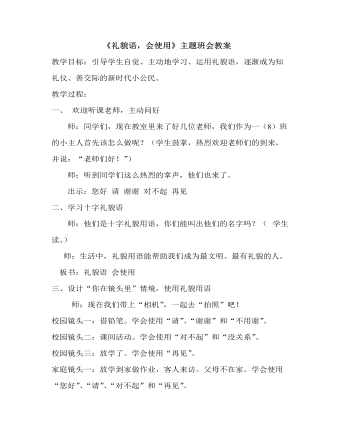
《礼貌语 会使用》主题班会教案
教学目标:引导学生自觉、主动地学习、运用礼貌语,逐渐成为知礼仪、善交际的新时代小公民。教学过程:一、 欢迎听课老师,主动问好 师:同学们,现在教室里来了好几位老师,我们作为一(8)班的小主人首先该怎么做呢?(学生鼓掌,热烈欢迎老师们的到来,并说:“老师们好!”)师:听到同学们这么热烈的掌声,他们也来了。出示:您好 请 谢谢 对不起 再见二、学习十字礼貌语师:他们是十字礼貌用语,你们能叫出他们的名字吗?( 学生读。)师:生活中,礼貌用语能帮助我们成为最文明、最有礼貌的人。板书:礼貌语 会使用
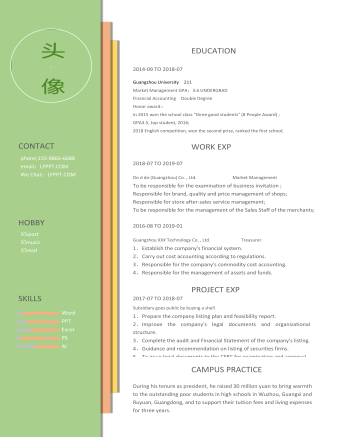
英文简历+中文简历
GuangzhouUniversity 211Market Management GPA:3.6 UNDERGRADFinancial Accounting Double DegreeHonor award::In 2015 won the school class"three good students" (# People Award) ;GPA3.5, top student, 2016;2018 English competition, won thesecond prize, ranked the first school;
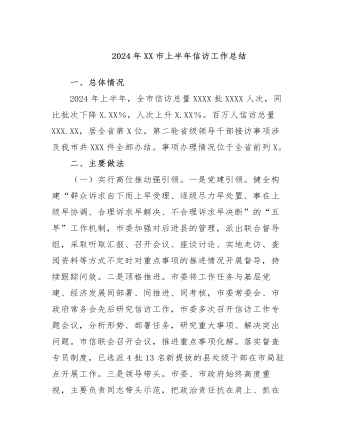
2024年XX市上半年信访工作总结
三、下步工作(一)守牢基层化解“主阵地”,竭力遏上行。深入开展矛盾纠纷排查化解,有效减少矛盾积累、问题上行、风险外溢。发挥常态化安保指挥部作用,对风险隐患进行预警和化解处置。(二)打好规范办理“主动仗”,全面提质效。对事项按照“十步法”,落实“三到位”,切实形成闭环,防止初转重。建立国家局登记求决类初件包保机制,确保程序性办结和实质性化解。对重复事项要溯源复盘,摸清缘由经过、主要诉求、政策依据、症结难点等,力争化解,防止重转积。对不满意件、未参评件高度关注,要求责任单位继续做好教育疏导工作,加强督查督办,既督问题解决、也查首办责任,属于失职失责的,提出追责问责建议。(三)啃下积案化解“硬骨头”,确保真解决。从讲政治的高度扛起重点事项化解责任,严格落实专班责任制,实行“一案一策、一人一专班”,找准事项突破口、压缩化解时限,办一件、结一件、了一件,确保事项真化解。

XX市2024年上半年信访工作总结
(一)守牢基层化解“主阵地”,竭力遏上行。深入开展矛盾纠纷排查化解,有效减少矛盾积累、问题上行、风险外溢。发挥常态化安保指挥部作用,对风险隐患进行预警和化解处置。(二)打好规范办理“主动仗”,全面提质效。对事项按照“十步法”,落实“三到位”,切实形成闭环,防止初转重。建立国家局登记求决类初件包保机制,确保程序性办结和实质性化解。对重复事项要溯源复盘,摸清缘由经过、主要诉求、政策依据、症结难点等,力争化解,防止重转积。对不满意件、未参评件高度关注,要求责任单位继续做好教育疏导工作,加强督查督办,既督问题解决、也查首办责任,属于失职失责的,提出追责问责建议。(三)啃下积案化解“硬骨头”,确保真解决。从讲政治的高度扛起重点事项化解责任,严格落实专班责任制,实行“一案一策、一人一专班”,找准事项突破口、压缩化解时限,办一件、结一件、了一件,确保事项真化解。

XX市工会2024年上半年法治工作总结
二是依法做好劳动争议调解工作。组建职工法律服务团,吸纳13名专业突出、热心公益的律师参与,明确法律援助工作流程及补贴标准,及时为职工提供专业、全面的法律咨询服务,引导职工依法理性表达诉求,今年接待职工来访100人次。联合市中级人民法院开展“法院+工会”劳动争议诉调对接工作,并在*市建立示范点,办理案件3件。三是全面提升工会法治建设水平。职工服务中心是各级工会组织开展法治宣传、服务职工的主要阵地。大力推动一站式职工服务中心建设,在全市范围内打造以市职工服务中心为龙头、乡镇(科局)职工服务中心为骨干,社区(村)职工服务中心为基础、企业职工服务中心为支撑的四级服务职工网络。服务中心设置了“政策咨询”、“法律援助”、“劳动争议调处”、“信访接待”、“心灵聊吧”和“权益维护”等服务窗口,促进工会法治建设进入了规范化、制度化和机制化轨道。

2024年上半年区城市管理工作总结
三是补齐市政设施建设短板。按照“花小钱、办实事”的原则,开展“城市体检”,排查城市污水、排水井116个,更换污水井盖27个、排水井12个;排查城市路灯1470个,更换维修310个;对城区21座桥梁进行安全排查,整改安全隐患4处;维护主次干道46处计5.11公里,维修人行道青石板453平方,更换城区损坏破损的座椅55把,疏通雨水管道216米,整治“空中管线”55处。五、重长效强监管,城市安全管理实现新突破一是大力开展油烟污染治理。对城区79家机关企事业单位,127家餐饮企业及城区工地食堂开展油烟污染全面排查检测1次,下发整改通知25份。实施规范管理,定期开展执法检查,要求“三个灶台”及以上必须安装油烟净化器,并聘请专业清洗公司对油烟净化器定期进行清洗,建立清洗台账,做好台账式管理,目前城区油烟净化装置安装使用率95%以上,达标排放率90%以上。
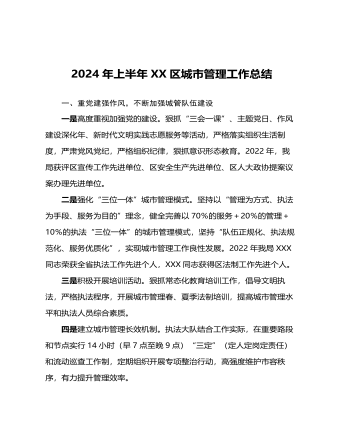
2024年上半年XX区城市管理工作总结
三是补齐市政设施建设短板。按照“花小钱、办实事”的原则,开展“城市体检”,排查城市污水、排水井116个,更换污水井盖27个、排水井12个;排查城市路灯1470个,更换维修310个;对城区21座桥梁进行安全排查,整改安全隐患4处;维护主次干道46处计5.11公里,维修人行道青石板453平方,更换城区损坏破损的座椅55把,疏通雨水管道216米,整治“空中管线”55处。五、重长效强监管,城市安全管理实现新突破一是大力开展油烟污染治理。对城区79家机关企事业单位,127家餐饮企业及城区工地食堂开展油烟污染全面排查检测1次,下发整改通知25份。实施规范管理,定期开展执法检查,要求“三个灶台”及以上必须安装油烟净化器,并聘请专业清洗公司对油烟净化器定期进行清洗,建立清洗台账,做好台账式管理,目前城区油烟净化装置安装使用率95%以上,达标排放率90%以上。
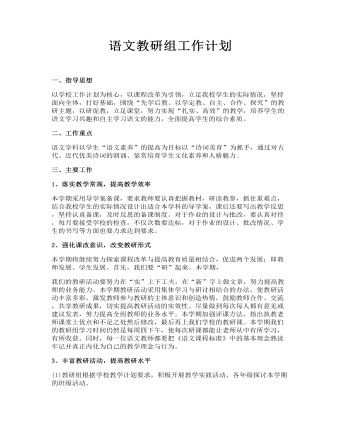
语文教研组工作计划
1、落实教学常规,提高教学效率本学期采用导学案备课,要求教师要认真把握教材,研读教参,抓住重难点,结合我校学生的实际情况设计出适合本学科的导学案,课后还要写出教学反思,坚持认真备课,及时反思的备课制度。对于作业的设计与批改,要认真对待,每月要接受学校的检查,不仅次数要达标,对于作业的设计、批改情况、学生的书写等方面也要力求达到要求。
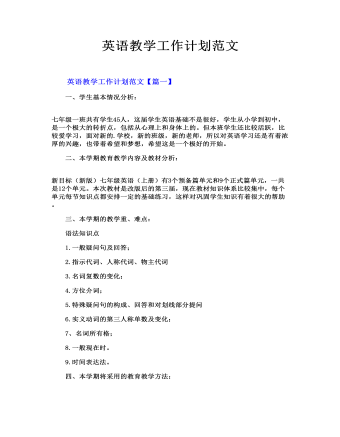
英语教学工作计划范文
1.用英语教英语(Teach English inEnglish); 英语毕竟是一门语言,训练的是学生的听、说、读、写、译的综合能力,在教学的过程中需要对学生的听、说、读、写、译的能力进行很多的训练,这就要求我们用英语来教英语,在课堂上对学生进行各种能力的训练。
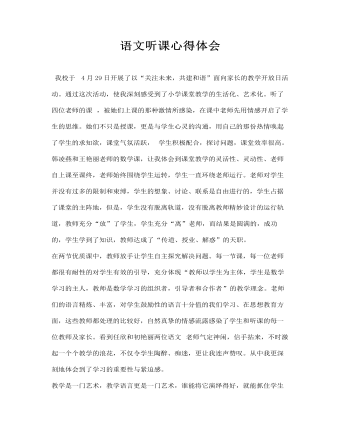
语文听课心得体会
在两节优质课中,教师放手让学生自主探究解决问题。每一节课,每一位老师都很有耐性的对学生有效的引导,充分体现“教师以学生为主体,学生是数学学习的主人,教师是数学学习的组织者,引导者和合作者”的教学理念。老师们的语言精炼、丰富,对学生鼓励性的语言十分值的我们学习、在思想教育方面,这些教师都处理的比较好,自然真挚的情感流露感染了学生和听课的每一位教师及家长。看到任欣和初艳丽两位语文老师气定神闲,信手拈来,不时激起一个个教学的浪花,不仅令学生陶醉、痴迷,更让我连声赞叹。从中我更深刻地体会到了学习的重要性与紧迫感。
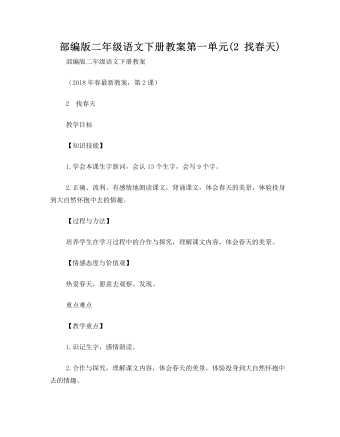
语文下册教案找春天
图文对照,读中感悟1.学习第1、2自然段。师:要去野外找春天了,课文中的小朋友现在是怀着什么样的心情呢?(高兴的、急切的、激动的)请你也带着这样的心情读一读第一、二自然段吧?自由读。指名读本段,读后评价悟出应把“脱”、“冲”、“奔”重读才能更加体现出孩子们找春天的迫切心情。2.请大家自由读第3 ~7自然段,想一想,作者把春天想象成什么了(一个害羞的小姑娘)。这个害羞的小姑娘,遮遮掩掩、躲躲藏藏的,不想让人们发现她。可是细心的小朋友还是找到了她。这些小朋友都在哪找到她了?你知道吗?从书中找到有关的句子再读一读。(学生边画、边读。)小草从地下探出头来,那是春天的眉毛吧?早开的野花一朵两朵,那是春天的眼睛吧?树林吐出点点嫩芽,那是春天的音符吧?解冻的小溪丁丁咚咚,那是春天的琴声吧?
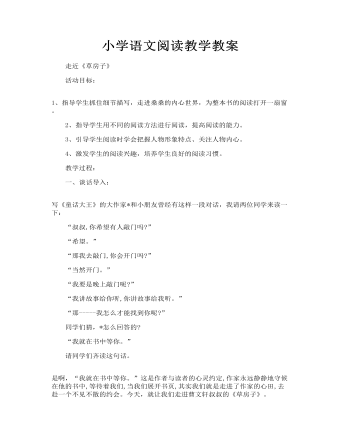
小学语文阅读教学教案
一、谈话导入: 写《童话大王》的大作家*和小朋友曾经有这样一段对话,我请两位同学来读一下: “叔叔,你希望有人敲门吗?” “希望。” “那我去敲门,你会开门吗?” “当然开门。” “我要是晚上敲门呢?” “我讲故事给你听,你讲故事给我听。” “那-----我怎么才能找到你呢?”
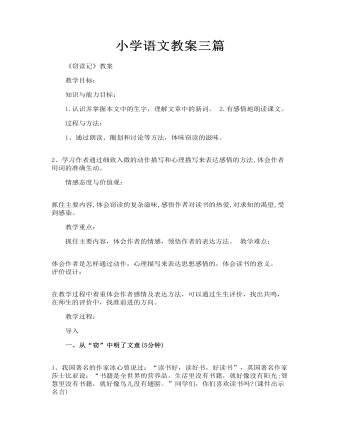
小学语文教案三篇
1、通过朗读、圈划和讨论等方法,体味窃读的滋味。 2、学习作者通过细致入微的动作描写和心理描写来表达感情的方法,体会作者用词的准确生动。 情感态度与价值观: 抓住主要内容,体会窃读的复杂滋味,感悟作者对读书的热爱,对求知的渴望,受到感染。 教学重点: 抓住主要内容,体会作者的情感,领悟作者的表达方法。 教学难点: 体会作者是怎样通过动作,心理描写来表达思想感情的,体会读书的意义。 评价设计: 在教学过程中着重体会作者感情及表达方法,可以通过生生评价,找出共鸣,在师生的评价中,找准前进的方向。
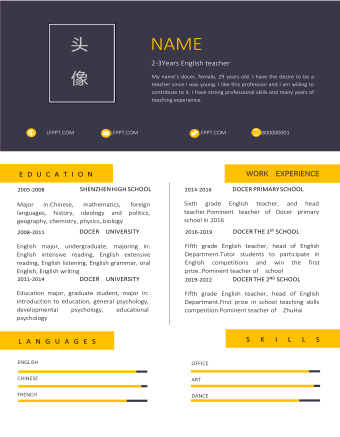
蓝黄色英语教师英文简历
Major in:Chinese, mathematics,foreign languages, history, ideology and politics, geography, chemistry,physics, biologyEnglishmajor, undergraduate, majoring in: English intensive reading, English extensivereading, English listening, English grammar, oral English, English writingEducationmajor, graduate student, major in: introduction to education, generalpsychology, developmental psychology, educational psychology




